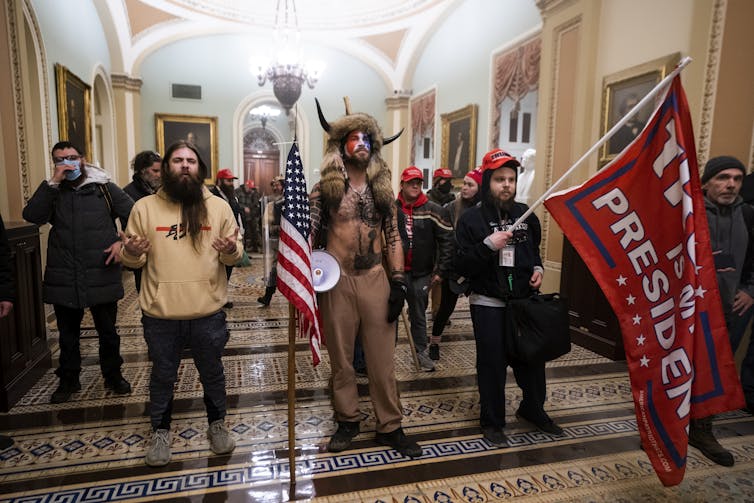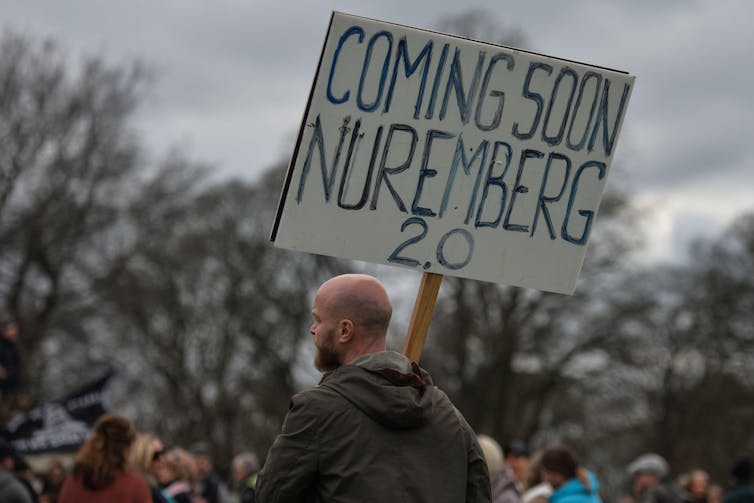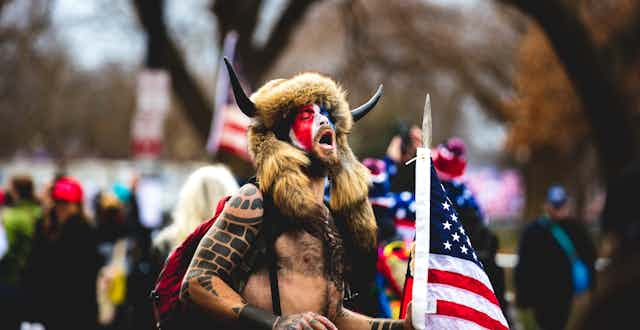Logically, authoritarianism and libertarianism are contradictory. Supporters of authoritarian leaders share a state of mind in which they take direction from an idealised figurehead and closely identify with the group which that leader represents. To be libertarian is to see the freedom of the individual as the supreme principle of politics. It is core to the economics and politics of neo-liberalism, as well as to some bohemian counter-cultures.
As a state of mind, libertarianism is superficially the opposite of authoritarianism. Identification with the leader or group is anathema and all forms of authority are regarded with suspicion. Instead the ideal is to experience oneself as a self-contained, free agent.
Yet there is a history of these two outlooks being intertwined. Consider Donald Trump, whose re-election in 2024 would be seen by many as adding to the international rise of authoritarianism.
Others might see him as insufficiently focused to be an effective authoritarian leader, but it’s not difficult to imagine him governing by executive order, and he has successfully sought an authoritarian relationship with his followers. He is an object of idealisation and a source of “truth” for the community of followers he purports to represent.
Yet at the same time, in his rhetoric and his persona of predatory freewheeler, in his wealth and indifference to others, Trump offers a hyper-realisation of a certain kind of individualistic freedom.
Trumpism’s fusion of the authoritarian and the libertarian was embodied in the January 6 attack in Washington DC. The insurgents who stormed the Capitol that day passionately wanted to install Trump as an autocratic leader. He had not, after all, won a democratic election.
But these people were also conducting a carnivalesque assertion of their individual rights, as they defined them, to attack the American state. Among them were followers of the bizarre conspiracy theory QAnon, who lionised Trump as the heroic authority figure secretly leading the fightback against a child-torturing cabal of elites.
Alongside them were the Proud Boys, whose misty libertarianism is paired with a proto-authoritarian commitment to politics as violence.

New age meets anti-vax
Conspiracy theories are also involved in other recent examples of authoritarian-libertarian hybridity. Beliefs that COVID-19 vaccines (or lockdowns, or the virus itself) were attempts by a malevolent power to attack or control us were fuelled by a growing army of conspiracists. But they were also facilitated by libertarian ideologies which rationalise suspicion of and antipathy towards authority of all sorts – and support refusals to comply with public health measures.
In the UK, some small towns and rural areas have seen an influx of people involved in a variety of pursuits – arts and crafts, alternative medicine and other “wellness” practices, spirituality and mysticism. Research is lacking but a recent BBC investigation in the English town of Totnes showed how this can create a strong “alternative” ethos in which soft, hippie-ish forms of libertarianism are prominent – and very hospitable to conspiracism.
One might have thought that Totnes and some other towns like it would be the last places we’d find sympathy for authoritarian politics. However, the BBC investigation showed that although there may be no single dominant leader at work, new age anti-authority sentiments can morph into intolerance and hard-edged demands for retribution against the people seen as orchestrating vaccinations and lockdowns.
This is reflected in some COVID conspiracists calling for those who led the public health response to be tried at “Nuremberg 2.0”, a special court where they should face the death penalty.
When we remember that a virulent sense of grievance against an enemy or oppressor who must be punished is a regular feature of authoritarian culture, we start to see how the dividing lines between the libertarian mindset and the authoritarian perspective have blurred around COVID.
Read more: Conspiracy theories about the pandemic are spreading offline as well as through social media
A disturbing survey conducted earlier this year for King’s College London even found that 23% of the sample would be prepared to take to the streets in support of a “deep state” conspiracy theory. And of that group, 60% believed the use of violence in the name of such a movement would be justified.

Two responses to the same anxiety
A psychological approach can help us to understand the dynamics of this puzzling fusion. As Erich Fromm and others have shown, our ideological affinities are linked to unconscious structures of feeling.
At this level, authoritarianism and libertarianism are the interchangeable products of the same underlying psychological difficulty: the vulnerability of the modern self.
Authoritarian political movements offer a sense of belonging to a collective, and of being protected by its strong leader. This may be completely illusory, but it nonetheless provides a sense of safety in a world of threatening change and risk. As individuals, we are vulnerable to feeling powerless and abandoned. As a group, we are safe.
Libertarianism, in contrast, proceeds from the illusion that as individuals we are fundamentally self-sufficient. We are independent of others and don’t need protection from authorities. This fantasy of freedom, like the authoritarian fantasy of the ideal leader, also generates a sense of invulnerability for those who believe in it.
Both outlooks serve to protect against the potentially overwhelming sense of being in a society on which we depend but which we feel we cannot trust. While politically divergent, they are psychologically equivalent. Both are ways for the vulnerable self to ward off existential anxieties. There is therefore a kind of belt-and-braces logic in toggling between them or even occupying both positions simultaneously.
In any specific context, authoritarianism is more likely to have the necessary focus and organisation to prevail. But its hybrid fusion with libertarianism will have broadened its support base by seducing people with anti-authority impulses.
And as things currently stand, we’re at risk of seeing increasing polarisation between, on one hand, this anxiety-driven, defensive form of combined politics, and on the other, efforts to preserve reality-based, non-defensive modes of political discourse.

